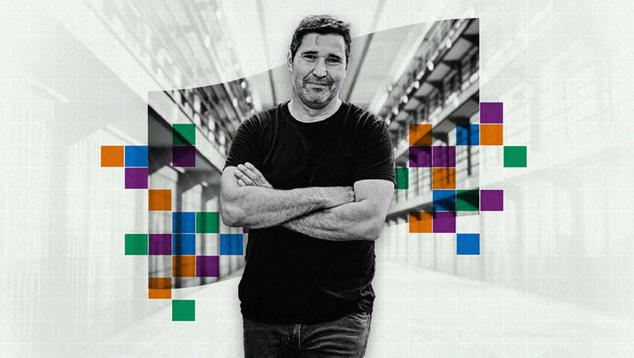Inside Nebraska’s prisons, a profound transformation is quietly taking place.
RISE is reshaping the lives of incarcerated individuals by focusing on their inherent strengths rather than their past mistakes.
Through a six-month in-prison program, participants gain the structure, support, and language to imagine something different and build toward it. At the heart of that process is CliftonStrengths, encouraging participants to reflect on their positive attributes, promote self-awareness, and, ultimately, build greater hope for the future.
Traditional correctional programs emphasize correcting what they consider broken. RISE does something different: Each week, individuals enrolled in the program answer a simple question: “How did your strengths show up this week?”
For some, it’s the first time anyone has ever asked about what they’ve been doing right.
Reentry With Dignity
RISE is Nebraska’s largest nonprofit dedicated exclusively to prison reentry programs. Its mission is to serve incarcerated individuals before and after release, while also supporting families and facilitating entrepreneurship. But at the heart of it all is a quiet but powerful belief: that transformation is more likely when people see themselves as capable of it.
“Our program is about employment, soft skills, healthy communication and conflict management. What we inadvertently see happen is you’re breaking down a lot of walls of shame, helping people recognize they do have talents, worth, and skills they should be proud of,” says Maria Moreno-Godemann, RISE’s Director of Programs. “Gallup strengths give us the language around that, and we use them every week.”
Participants begin with CliftonStrengths early in their six-month in-prison course. They review their strengths each week through exercises that help them reflect, reframe and reclaim who they are using strengths language. Someone who others called “loud” begins to see themself as a skilled communicator. A person who always asks “why” now understands they have the Input theme. One participant told Moreno-Godemann that no one had ever told him he was good at anything.
At RISE, that changes.
From Deficit to Identity
In 2019, RISE revised its curriculum to incorporate strengths into every part of its six-month reentry program. Moreno-Godemann, whose own top themes include Developer, Empathy, and Positivity, had seen how using strengths language could help reframe experiences. What emerged at RISE was a model that treated identity growth not as an add-on, but as the foundation for escaping the cycle of incarceration.
Facilitators model the same language they teach, using a team strengths matrix to show collaboration in action with colleagues. Weekly check-ins allow participants to reinforce how strengths show up in real conversations, conflict and practical tasks. Staff also point out themes when they notice others using them.
“Time and time again, participants say, ‘I have only been told the things I am bad at, and the ways I’ve failed and let other people down.’ Through our program, and through the way we engage with our participants and use humanizing, strengths-based language, they start to see value in themselves,” Moreno-Godemann says. “You start to see people stand a little taller and hold their heads up higher.”
The results are extensive and measurable. RISE tracks hope levels at the start and end of the program. Hope is often low initially, but in 2024, 72% of participants expressed an increase in hope after completing RISE’s curriculum.
In contrast to programs that reduce recidivism by focusing on what’s broken, RISE measures desistance, a more humanizing way to capture lasting change. Desistance both captures the absence of new charges and seeks reduced severity if someone reoffends. RISE’s desistance rate is an unprecedented 96%.
In a system that historically emphasizes deficits, these numbers are a powerful example of what’s possible when multiple forces come together to champion human potential.
A Systemwide Shift
RISE’s influence extends beyond its participants. Staff at the Nebraska Department of Correctional Services have gone through strengths training, and many now list their top themes in email signatures. It is a small but potent symbol of prison reform in a system often concentrated on what people lack.
And the broader culture shift makes a difference. “In this work, language matters. Prison can break people down and make them feel very small. We have to set the stage for reflection, asking, ‘If I was to pull away all of the labels I currently use, who am I?’ And next, give participants some language around what strengths are innately built in them and how they actually navigate the world,” says Moreno-Godemann.
RISE’s work continues post-release through its Business Academy, a 12-week program for aspiring entrepreneurs. Returning citizens build ventures aligned with their strengths. Of the 69 graduates so far, 38 are running active businesses, and some are launching their second.
“I always thought starting a business was for smart people, skilled people — people who had it all together,” says a 2025 RISE graduate. “I didn’t think I had what it took. But RISE gave me the confidence and the tools I needed. They helped me see the strengths in myself.”
Real Change, One Strength at a Time
RISE’s approach doesn’t pretend that reentry is easy. They’re building people up for the hard days: the job interviews, the adaptations to a life after prison, the slow rebuilding of trust and normalcy. The difference is that people don’t walk through those days alone, and they don’t walk through them defined solely by the worst chapters of their lives.
Instead, they carry with them a vocabulary of potential, a set of tools and a plan. All of this is accompanied by a growing belief, often for the first time, that they have something the world needs.
Have a story like this to share? We’re looking for organizations and individuals using CliftonStrengths in new ways to solve real challenges. Email your suggestions to Strengths_Engineering@gallup.com.
Use CliftonStrengths to show people their highest potential and create hope for the future.




